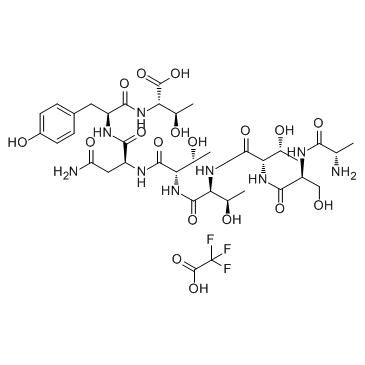1610056-01-3
| Name | Peptide T TFA |
|---|
| Description | Peptide T (TFA) is an octapeptide from the V2 region of HIV-1 gp120. Peptide T is a ligand for the CD4 receptor and prevents binding of HIV to the CD4 receptor. |
|---|---|
| Related Catalog | |
| Target |
CD4, HIV[1] |
| In Vitro | Peptide T acts to block viral entry as it inhibits in the MAGI cell assay and blocks infection in the luciferase reporter assay using HIV virions pseudotyped with ADA envelope. Peptide T selectively inhibits HIV replication using chemokine receptor CCR5 compared to CXC4[2]. Peptide T at 10-8 M induces IL-10 production by the human Th2 cell line and PBMC. Also peptide T at 10-9 M concentration significantly inhibits IFN-g production by PBMC[3]. |
| In Vivo | Peptide T is administered subcutaneously at different doses and phases of the experimental autoimmune encephalomyelitis (EAE) disease, but Peptide T neither prevents nor ameliorates EAE[4]. |
| Cell Assay | Peripheral blood mononuclear cells are stimulated with PHA (5 mg/mL) along with various concentrations of peptide T (10-6-10-12 M) for 48 h at 37°C. Supernatants are collected and frozen until analysis[3]. |
| Animal Admin | Rats[4] Peptide T (125, 250, 500, 800 μg) is randomly given subcutaneously to Female Lewis rats aged 6-8 weeks in the hind foot flanks in a final volume of 0.2 mL. Control animals receive the same volume of saline alone[4]. |
| References |
| Molecular Formula | C37H56F3N9O18 |
|---|---|
| Molecular Weight | 971.89 |
| Storage condition | 2-8℃ |
